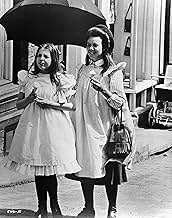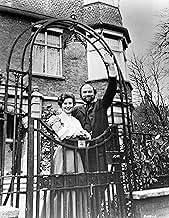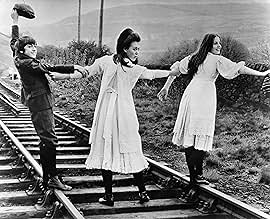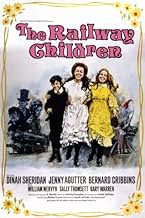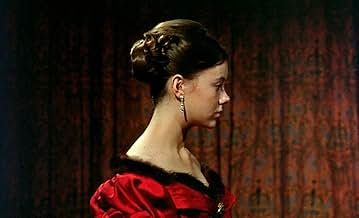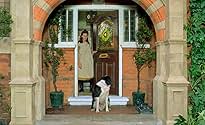NOTE IMDb
7,3/10
6 k
MA NOTE
Après l'absence forcée de leur père, trois enfants déménagent avec leur mère dans le Yorkshire où, au cours de leurs aventures, ils tentent de découvrir la raison de sa disparition.Après l'absence forcée de leur père, trois enfants déménagent avec leur mère dans le Yorkshire où, au cours de leurs aventures, ils tentent de découvrir la raison de sa disparition.Après l'absence forcée de leur père, trois enfants déménagent avec leur mère dans le Yorkshire où, au cours de leurs aventures, ils tentent de découvrir la raison de sa disparition.
- Réalisation
- Scénario
- Casting principal
- Nomination aux 3 BAFTA Awards
- 3 nominations au total
Dinah Sheridan
- Mrs. Waterbury
- (as Miss Dinah Sheridan)
Bernard Cribbins
- Albert Perks
- (as Mr. Bernard Cribbins)
William Mervyn
- Old Gentleman
- (as Mr. William Mervyn)
Iain Cuthbertson
- Charles Waterbury
- (as Mr. Iain Cuthbertson)
Jenny Agutter
- Bobbie Waterbury
- (as Miss Jenny Agutter)
Sally Thomsett
- Phyllis Waterbury
- (as Miss Sally Thomsett)
Gary Warren
- Peter Waterbury
- (as Master Gary Warren)
Avis à la une
...apparently Bernard Cribbins ad libbed nearly all of his lines. If you can sit through the 'Daddy! Oh my daddy" bit without blubbing then you really need to get in touch with your inner child (trust me. I'm a 41 year old bloke).
Back in 1970 at the tender age of 23, I fell hopelessly in love with Jenny Agutter - and remain so to this day. For it is this film for which she will always be associated - and for the very best reasons. It in no way typecast Miss Agutter, but clearly marked her as an actress of outstanding ability.
Nesbit's characters are brought to life by Lionel Jeffries production in what must be one of literature's most heart rending stories. It has everything - pathos, compassion, empathy, humour, loyalty and love, attributes once common in Great Britain, but sadly no longer.
Who can suppress those tears at Bobby's discovery of her Father at the station. "My Daddy... my Daddy...!" as she runs towards him?
This film should be available on prescription - it is indeed a tonic for whatever ails you.
As for my love of Miss Agutter - it remains undiminished, and when I see her today, I still see that porcelain complexion, those bewitching eyes and that come hither smile.
Nesbit's characters are brought to life by Lionel Jeffries production in what must be one of literature's most heart rending stories. It has everything - pathos, compassion, empathy, humour, loyalty and love, attributes once common in Great Britain, but sadly no longer.
Who can suppress those tears at Bobby's discovery of her Father at the station. "My Daddy... my Daddy...!" as she runs towards him?
This film should be available on prescription - it is indeed a tonic for whatever ails you.
As for my love of Miss Agutter - it remains undiminished, and when I see her today, I still see that porcelain complexion, those bewitching eyes and that come hither smile.
The Railway Children was on TV again this weekend, and I had forgotten how good it was.
If I have a criticism, it is that the episodic structure sometimes shows a little too clearly, there being little narrative flow from sequence to sequence. The charm and beauty of the film are such that this matters very little, however.
I won't revisit the comments of others, other than to add my vote for the final scene on the platform as being possibly the single most emotional scene in the history of British cinema: as a cynical old git passing through middle age rather too quickly I, too, find I cannot even think of that moment without being hit with a severe case of "I've got something in my eye." In fact, it's not just something in my eye, it moves things around inside me, too, with that beautiful happy pain we sometimes feel.
And Jenny Agutter was exquisitely beautiful in this film, standing with one foot in childhood and one in young womanhood, and bringing qualities of both to her portrayal of a girl having to grow up rather too quickly.
Plus a quick plaudit for Bernard Cribbins. Regarded mostly as a lightweight actor, he deftly created a Perks of great humanity.
If I have a criticism, it is that the episodic structure sometimes shows a little too clearly, there being little narrative flow from sequence to sequence. The charm and beauty of the film are such that this matters very little, however.
I won't revisit the comments of others, other than to add my vote for the final scene on the platform as being possibly the single most emotional scene in the history of British cinema: as a cynical old git passing through middle age rather too quickly I, too, find I cannot even think of that moment without being hit with a severe case of "I've got something in my eye." In fact, it's not just something in my eye, it moves things around inside me, too, with that beautiful happy pain we sometimes feel.
And Jenny Agutter was exquisitely beautiful in this film, standing with one foot in childhood and one in young womanhood, and bringing qualities of both to her portrayal of a girl having to grow up rather too quickly.
Plus a quick plaudit for Bernard Cribbins. Regarded mostly as a lightweight actor, he deftly created a Perks of great humanity.
I avoided this film as a boy because I thought it would be boring
no fights or shooting, cops, robbers, cowboys or Indians. It was definitely not a cool film to like. So I didn't see TRC until I was in my twenties and found it one of the most beautiful, captivating films I have seen. All the actors deliver the characterisations perfectly and each emotion is drawn from the viewer scene by scene. The filming and direction are deceptively simple but feel so natural and drew me completely into the story. My two favourite scenes are Bobbie's birthday party and the scene on the station platform near the end, directed and edited to perfection. The quality and phrasing of Jenny Agutter's voice when she calls: 'Daddy! My Daddy!' wrenches emotion from the viewer. Tears are welling in my eyes as I think of it.
This adaptation isn't just a movie it is a piece of precious art, as well as being the perfect example of what all film makers should be striving to achieve creation of an emotional experience.
This adaptation isn't just a movie it is a piece of precious art, as well as being the perfect example of what all film makers should be striving to achieve creation of an emotional experience.
10ozmy21
This is a film that I love above all others. I try to revisit the main film locations in Oakworth and Oxenhope whenever I can, which help to re-establish those magical qualities that this film seems to embody so uniquely - recalling a gentler and more mannered age, with its unspoken assertions that people really do matter, that family life is not just another disposable, and that life really is worth living (though sometimes, we may doubt that). In short, a film that soon brings tears to my eyes, helped perhaps by the deeply evocative music - some tunes are jaunty (like the Perks' tune, played on a trombone, sometimes with spoons), the stirring melody when the family first set off for Yorkshire not knowing what lies ahead, and the haunting little tune played on a solo clarinet (or is it an oboe?) that precedes sudden child-felt changes in fortune.
This is as much a film for adults as for children, appealing to the eternal child in us all - a key that effortlessly reactivates those deep and apparently long-lost values and feelings buried inside us, which are normally swept aside by the demands of modern everyday life. This is a film about basic human goodness and decency in which we the viewers are left to make of it what we will, and there are welcome touches of humour sometimes added for good measure, such as the arrival of the aunt or, on a more earthy level, the bedroom scene on Perks' birthday - "All right Bert - as it's your birthday!" I must know every scene, every line of this film, and yet so great is the magic that each time I watch, it is like I am opening a box of delights for the first time, savouring each moment - sometimes humorous, sometimes....well, very different. As Peter says in the film: "it's perfect - more perfect than you know". And so it is!!!
This is as much a film for adults as for children, appealing to the eternal child in us all - a key that effortlessly reactivates those deep and apparently long-lost values and feelings buried inside us, which are normally swept aside by the demands of modern everyday life. This is a film about basic human goodness and decency in which we the viewers are left to make of it what we will, and there are welcome touches of humour sometimes added for good measure, such as the arrival of the aunt or, on a more earthy level, the bedroom scene on Perks' birthday - "All right Bert - as it's your birthday!" I must know every scene, every line of this film, and yet so great is the magic that each time I watch, it is like I am opening a box of delights for the first time, savouring each moment - sometimes humorous, sometimes....well, very different. As Peter says in the film: "it's perfect - more perfect than you know". And so it is!!!
Le saviez-vous
- AnecdotesSally Thomsett was twenty when she was cast as eleven-year-old Phyllis. Her contract forbade her to reveal her true age during the making of the film and she was not allowed to be seen smoking, drinking, going out with her boyfriend or driving the sports cars that were her passion. Even the film crew did not know her true age.
- GaffesAs the engine approaches Bobbie in the 'landslide sequence' and comes to a halt, drifting steam is seen coming down from the sky and entering its funnel, indicating the shot is actually reversed footage of the train backing away from Bobbie so as to not endanger the actress by attempting a precision stop inches away from her.
- Citations
Mrs. Waterbury: May I borrow your lamp please.
Cart Man: I dare say.
Mrs. Waterbury: If you say 'I dare say' once more I shall have hysterics, I dare say.
- Crédits fousAs the end credit captions are displayed the shot tracks towards a steam locomotive, in front of which are gathered the principal cast. They are surrounded by extras portraying local townspeople, who wave and say goodbye to the audience. All the while, Jenny Agutter is preoccupied with writing something on a slate. As the camera reaches her, she holds it up to display the words "The End".
- ConnexionsEdited into The Hound of the Baskervilles (1972)
- Bandes originalesThe Man who broke the bank at Monte Carlo
(uncredited)
Written by Fred Gilbert
Performed by Amelia Bayntun (as the cook) and the children
Meilleurs choix
Connectez-vous pour évaluer et suivre la liste de favoris afin de recevoir des recommandations personnalisées
- How long is The Railway Children?Alimenté par Alexa
- Is "The Railway Children" based on a book?
- Is it possible to read this book online?
- In what year does the story take place?
Détails
- Date de sortie
- Pays d’origine
- Langues
- Aussi connu sous le nom de
- The Railway Children
- Lieux de tournage
- Bents Farm, Oxenhope, Keighley, Bradford, West Yorkshire, Angleterre, Royaume-Uni(Three Chimneys - Waterburys' house)
- Société de production
- Voir plus de crédits d'entreprise sur IMDbPro
Box-office
- Montant brut mondial
- 32 239 $US
- Durée1 heure 49 minutes
- Rapport de forme
- 1.66 : 1
Contribuer à cette page
Suggérer une modification ou ajouter du contenu manquant

Lacune principale
By what name was Les enfants du chemin de fer (1970) officially released in India in English?
Répondre



